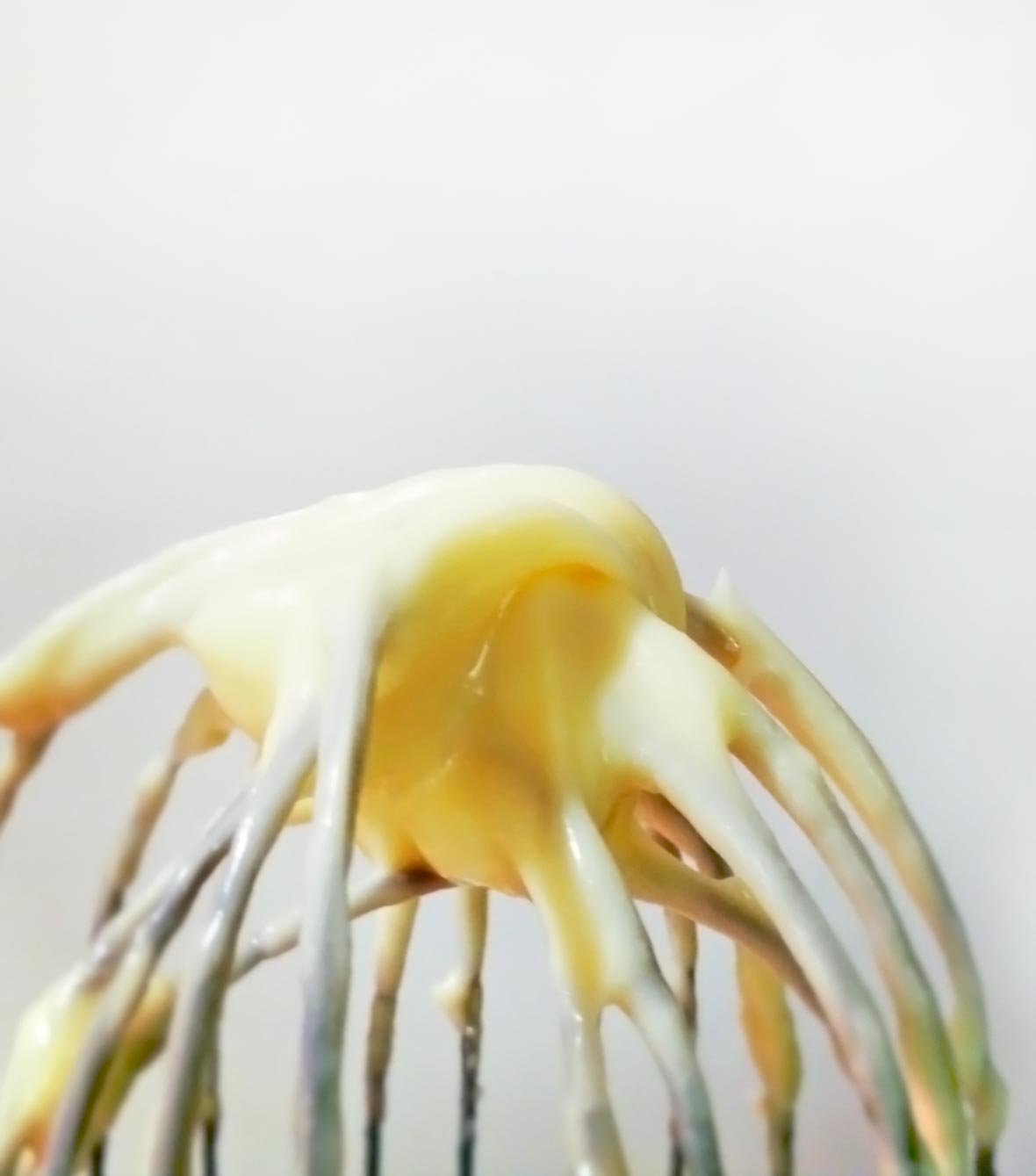
Millions have become adept at slathering mayo on all manner of food stuff. Yet few have attempted to make it at home. This foolproof recipe may change that.–Renee Schettler Rossi
How to Fix Broken Mayo
“If your mayonnaise falls apart—that is to say, if the ingredients separate instead of remaining suspended in a homogeneous emulsion—all is not lost,” says renowned chef Joël Robuchon. His advice? “Leave the broken mayonnaise out at room temperature for a half hour. Beat in a half teaspoon of mustard, preferably with an electric mixer. Put a spoonful of warm water in a bowl and beat in a spoonful of the broken mayonnaise, adding it bit by bit and beating at high speed. The mixture should foam. In the same way add a second spoon of the mayonnaise, and then a third. You should see the sauce thickening and ‘taking.’ Now using a small ladle, very gradually incorporate the rest of the broken mayonnaise into the new mixture. The finished product will be perfectly smooth and firm.” See how easy that was?
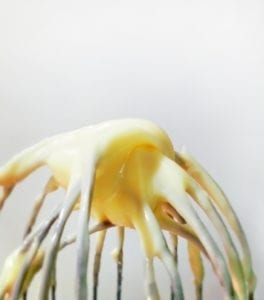
Homemade Mayonnaise
Ingredients
- 1 egg yolk
- 1 teaspoon Dijon mustard, or more to taste
- Salt
- White pepper
- Several drops vinegar (and up to 1 teaspoon), any kind
- 1 cup mild vegetable oil
Instructions
- Take the egg and mustard out of the refrigerator and let rest at room temperature for at least 30 minutes to facilitate emulsification and ensure a firm mayonnaise.
- In a big bowl, combine the egg yolk, mustard, a pinch of salt, a pinch of pepper, and a few drops of vinegar. If you can, use a stand or electric mixer with a bowl or an immersion blender with a wide-mouth Mason jar. If using an electric mixer, hold the beaters at an angle to the bottom of the bowl to facilitate emulsification. Begin to beat at the highest speed, continuing until the contents of the bowl are completely combined. With the beaters running, begin to SLOWLY add the oil, drop by drop at first and then in a slow, steady, thin stream. Stop adding oil but keep beating. You should soon see the mayonnaise "take," that is, begin to look like thick mayonnaise and not like an oily liquid. When this happens, you can resume adding the oil in a thin stream, still beating, but never add a large amount at once. This could cause the emulsion to liquefy.
- Taste. If the mayonnaise needs salt, do not add salt directly, for the sauce will not be able to absorb it. Instead, put a pinch of salt in a bowl and add a bit of vinegar, about half a teaspoon. Dissolve the salt in the vinegar and then stir it into the mayonnaise.
- Your mayonnaise is ready and will keep, covered or stored in a Mason jar with a lid, for a few days when stashed in the back of the refrigerator.
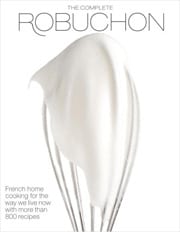
Nutrition
Nutrition information is automatically calculated, so should only be used as an approximation.
Recipe Testers’ Reviews
This is one little kitchen hack that will improve the quality of your life—or at least of your sandwiches, deviled eggs, tuna salads, etc.
This homemade mayonnaise is simple and so much better than the storebought stuff. I used 1 tbsp. white wine vinegar that had been infused with garlic/tarragon/pink peppercorns, but any nice sharp vinegar would do. I also used the whole egg.
With a little zing from the Dijon and vinegar, you have a nice basic platform to take in any number of directions—you could swap the vinegar for lemon juice, maybe add herbs and spices. This mayo is stable and rich and can take some add-ins without breaking down.
To make it even easier, I used an immersion blender to mix it all up. The key is to use a jar that just barely fits the head of your blender (I used a wide-mouth Mason jar). Start with the egg, vinegar, salt, pepper, and mustard in the bottom of the jar. Put the blender in and make sure the yolk is cupped under the head of the blender in contact with the blades. Add the oil all at once and turn the blender on with the blades on the bottom of the cup. The vortex created will pull the oil in slowly and you can watch the magic of emulsification happen in seconds! Once it looks creamy, just raise and lower the head a couple of times to make sure the entire batch is evenly mixed. You will end up with approx. 1 1/4 cups of the best mayo ever.
Bring on the BLTs! The creamy dressings! The potato salads! I may never buy another jar of storebought mayo again!
Once you learn how to make homemade mayonnaise, you won’t buy it anymore. Just follow the instructions to the letter and for sure you get a smooth and dense mayonnaise.
Make sure the ingredients are all at room temperature and use an electric mixer, as this facilitates the emulsification process. But if for any reason the mayonnaise is broken, you can fix it following the instructions on the recipe. Everything happened just like described in the instructions. I needed to add more salt so I dissolved it with white wine vinegar and stirred it into the mayonnaise. To give an extra flavor, you can add a tablespoon of olive oil to the vegetable oil before the addition to the egg yolk mixture.
I wasn’t sure about this recipe as the mayo I normally prepare used 2 eggs to the same quantity of oil. However this was most definitely a hit! The resulting mayonnaise is rich, creamy and moreish.
Don’t scrimp on the vinegar—I used more than 1 teaspoon. If making it again, I will double the recipe for 2 reasons. First, it’s delicious! Can be used as a dip, a sauce on meats, a sandwich spread, a salad dressing and so much more. Second, a practical advantage: it takes time to emulsify the ingredients to form a mayonnaise. i think it would be more manageable if working with a larger volume of the base ingredients than just 1 egg yolk.
I added the oil very, very slowly based on past disastrous attempts at mayo—literally one drop at a time for approximately 50 ml. Therefore it took me 10 minutes to get to stage where I could say it was starting to show signs of thickening. After that I added bigger splashes.
I followed the method for adding salt, mainly because i wanted to sharpen it up with a little more vinegar and so increased the seasoning slightly at the same time. this method worked perfectly.
This mayonnaise came together perfectly for me. After blending the yolk and mustard, I added a few drops of oil and then a few more. I saw it emulsify and come together. At that point, I began a tiny stream of oil and the mixture began to look oily. I let it blend on high for about 30 seconds and it came back together. I then continued the tiny stream and blended on high for 3 more minutes until all of the oil was used. It needed extra salt so I dissolved a pinch in 1/2 tsp vinegar and added it to the mayonnaise with a quick blend.
I wanted to showcase the mayonnaise so I made a simple egg salad with boiled eggs, red bell pepper, green onions, and dill. The mayonnaise was very firm and gave a nice texture, body, and homemade taste to the egg salad. Homemade mayonnaise is quick and satisfying to make, and so much better than purchased.


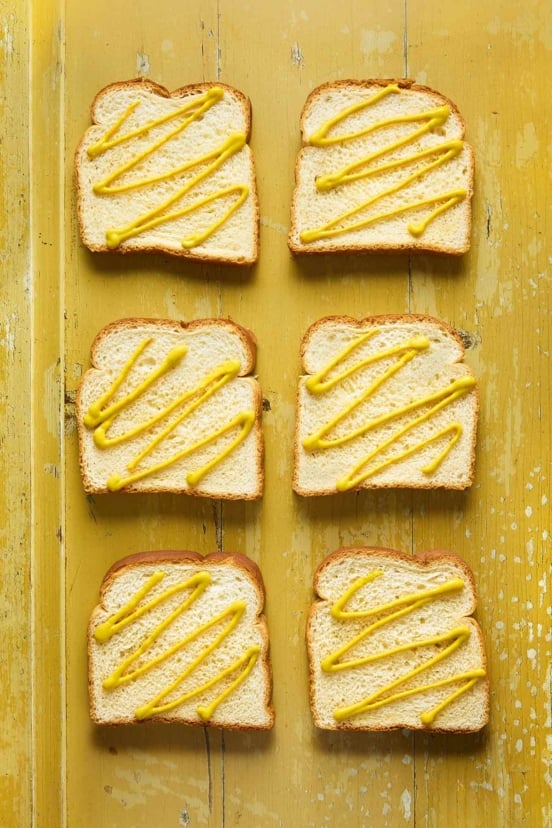
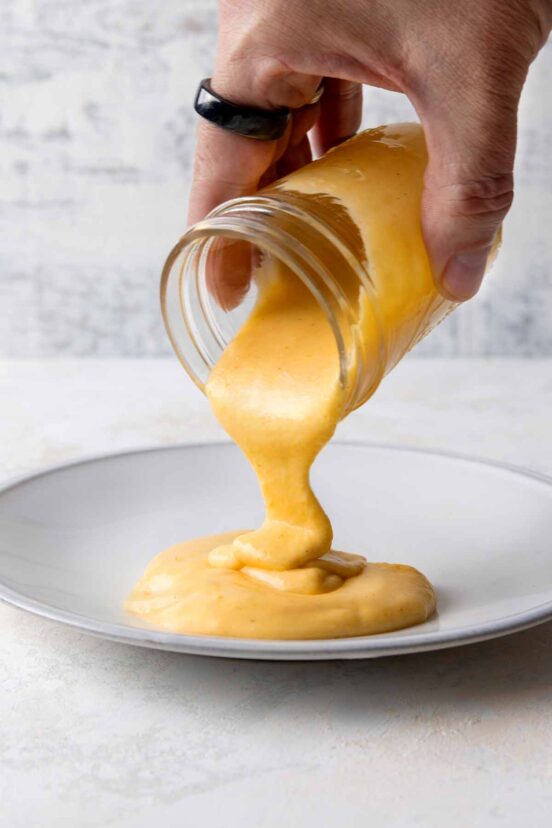
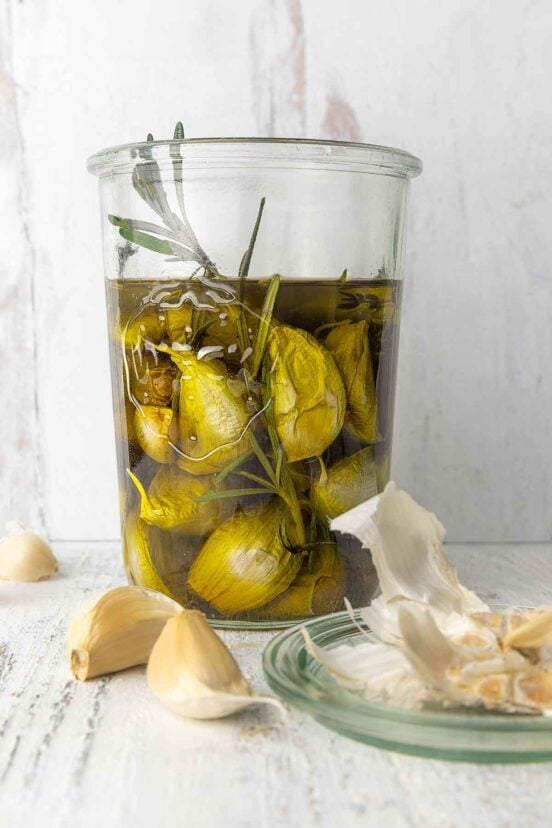









Very wonderful and tasty sauce. Thanks for sharing the recipes!
Thao, we love it whenever “wonderful” is amplified by “very.” Thank you for letting us know you enjoyed the recipe!